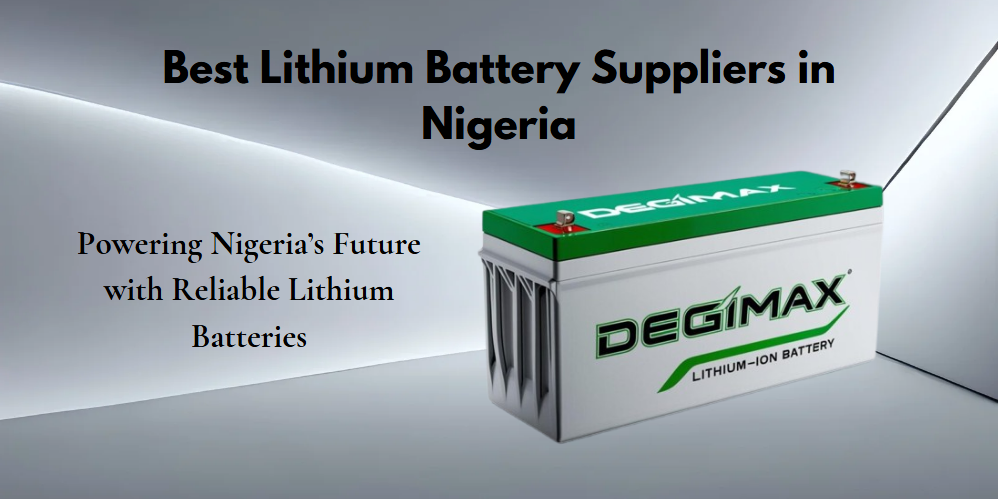In recent years, Nigeria has witnessed a surge in demand for reliable and sustainable energy solutions, emerging as the preferred choice for individuals and businesses alike. Whether for solar energy systems, electric vehicles, or power backups, the need for high-performance batteries has never been greater. Selecting the best lithium battery suppliers in Nigeria is crucial to ensuring efficiency, longevity, and value for money.
With numerous lithium battery suppliers entering the market, choosing a trusted provider is essential to avoid substandard products. This comprehensive guide will cover everything you need to know about these batteries, their advantages, essential factors to consider when selecting a supplier, and where to find the most reliable options.
Why Are These Batteries Gaining Popularity?
These batteries have revolutionized energy storage, outperforming traditional lead-acid batteries in nearly every aspect. Here’s why they are becoming the go-to choice for Nigerians:
1. Longer Lifespan
Unlike conventional lead-acid batteries, which typically last between 3-5 years, they can last up to 10 years or more. Their extended lifespan translates to significant cost savings over time, making them a smart investment.
2. Higher Energy Efficiency
These batteries offer better charge retention and efficiency compared to other battery types. They charge faster and provide a steady power supply, making them ideal for high-demand applications.
3. Lightweight and Compact Design
Compared to traditional batteries, they are significantly lighter and more compact, allowing for easier installation and transportation. This feature is especially useful for electric vehicles and mobile power solutions.
4. Low Maintenance Requirements
One of the biggest advantages of is that they require little to no maintenance. Unlike lead-acid batteries, which need regular water refilling and cleaning, they are hassle-free and designed for long-term use.
5. Eco-Friendly and Safe
With rising concerns over environmental sustainability, these batteries offer a greener alternative. They do not emit harmful gases, have a lower carbon footprint, and are safer to use compared to other battery types.
Applications of Lithium Batteries in Nigeria
The demand for lithium batteries is growing across various sectors. Some of the most common applications include:
Solar Energy Systems:
They are widely used for solar power storage, ensuring a stable power supply even during outages.
Electric Vehicles (EVs):
As Nigeria gradually shifts towards electric mobility, these batteries are powering EVs due to their efficiency and long lifespan.
Telecommunication Systems:
Many telecom companies use them for uninterrupted network services.
Home and Business Backup Power:
In a country where power outages are frequent, serve as reliable backup power sources.
Essential Factors to Keep in Mind When Selecting a Lithium Battery Provider
Selecting the right supplier is essential for obtaining high-quality and durable batteries. Here are key factors to consider:
1. Product Quality and Certification
Always choose suppliers that offer certified products meeting international quality and safety standards. Verified certifications, such as CE, UL, and ISO, ensure that the battery has passed rigorous safety tests.
2. Variety of Products
The best lithium battery suppliers in Nigeria should provide a wide range of batteries used for different needs, including solar batteries, EV batteries, and backup power solutions.
3. Pricing and Cost-Effectiveness
While lithium batteries may have a higher upfront cost than lead-acid batteries, their durability and efficiency make them a better long-term investment. Compare prices among different suppliers to get the best deal without compromising on quality.
Where to Find the Best Lithium Battery Suppliers in Nigeria?
Having several reputable suppliers offering high-quality lithium batteries. Here are some places where you can find reliable suppliers:
1. Online Marketplaces
Many suppliers operate online stores where you can browse through different battery options, compare prices, and place orders conveniently. Websites such as Jumia, Konga, and other e-commerce platforms feature a variety of lithium battery brands.
2. Specialized Energy and Solar Equipment Stores
Several local and international energy companies have dedicated stores and showrooms in major cities like Lagos, Abuja, and Port Harcourt. Visiting these stores allows you to inspect products physically and get expert advice on the best options.
3. Direct Manufacturer Distributors
Many global battery manufacturers have authorized distributors in the country. Buying directly from these distributors ensures you get genuine, high-quality batteries at competitive prices.
4. Industrial and Wholesale Suppliers
For businesses and large-scale energy projects, bulk purchasing from industrial suppliers can be a cost-effective option. Many wholesale distributors offer discounts on large orders and provide customized solutions for commercial clients.
Tips for Maintaining Your Lithium Battery
Once you’ve chosen these battery suppliers, proper maintenance is key to maximizing battery lifespan. Follow these tips for optimal performance:
- Avoid overcharging and deep discharging to prevent battery degradation.
- Store batteries in a cool, dry place to protect them from extreme temperatures.
- Use a compatible charger recommended by the supplier to prevent damage.
- Regularly check battery performance and consult a professional if you notice any irregularities.
Conclusion
The demand for lithium batteries is increasing due to their efficiency, durability, and eco-friendliness. Whether for solar power storage, electric vehicles, or backup energy solutions, choosing the best lithium battery suppliers in Nigeria is essential for ensuring quality and long-term benefits.
By choosing a reliable supplier and evaluating key factors like quality, warranty, and pricing, along with following proper maintenance practices, you can maximize the benefits of this advanced battery technology. Investing in these power solutions today ensures a dependable and sustainable energy source for the future.
